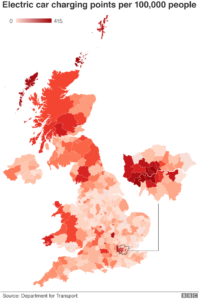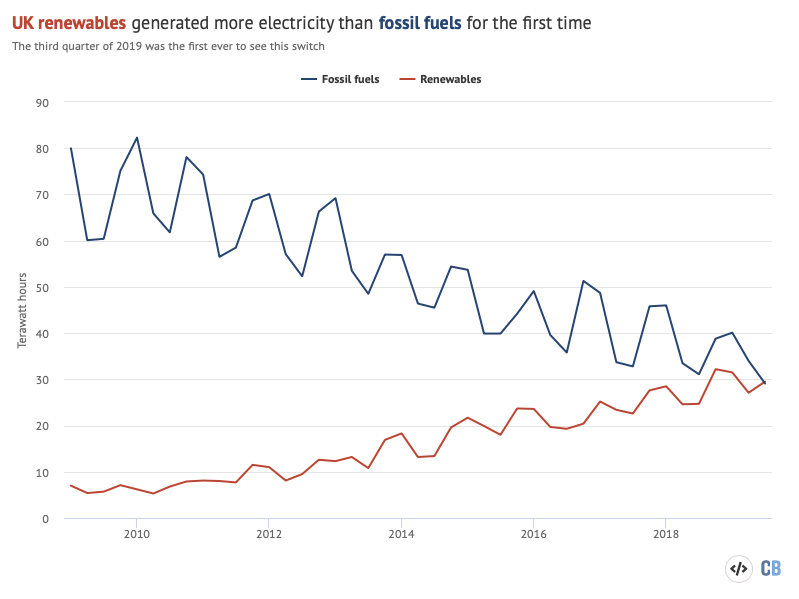A recent BBC article is entitled “Electric cars: Best and worst places to charge your car”.
Extract:
The government has published new league tables showing which regions of the UK have the most charging points for drivers of electric vehicles. The most per 100,000 people are in London, followed by Scotland, while Yorkshire is the worst by that measure.
Outside London, Orkney and Milton Keynes have the most. But Barrow-in-Furness and Scilly each have none.
There’s a nice map showing the current state of play.

A bit later, though, the article starts to introduce some rather worrying numbers:
The government wants the UK to have net zero carbon emissions by 2050. Scottish Power estimates that in order to achieve this, the UK needs to have 25 million charging points for electric vehicles – the equivalent of installing 4,000 a day – and 23 million electric heat pumps to replace domestic gas boilers.
Mmm.
This is a topic of great interest to me, and the underlying data is useful, but the article is somewhat flawed almost from the start. The first thing to notice is that it never distinguishes between public and private charging points. In fact, if you look at the source, the league table is talking about public charging points, where Scottish Power are talking about public and private ones.
Nonetheless, it is indeed a lot of charging points, though the article’s second error is in ascribing the figure of 4000 installations per day to car chargers: in fact the numbers are about 2000 each for chargers and for heat pumps.
Then they hammer home the size of the challenge with this:
And all at a cost of nearly £300bn.
Wow! Another big and scary number. How on earth are we ever going to do this?
But let’s think about it for a moment…
Many numbers are not quite so scary when you consider them rationally and in context.
25 million is approaching the current number of households in the UK, and, yes, if we don’t have petrol vehicles, most people will probably want to charge their cars at home. That’s also why the heat-pump number is on a similar scale.
But remember, we’re talking about a target which is 30 years away.
According to this article, the UK installed 1.7 million new boilers in 2018! This makes sense, if you think about it: how many households are there, and how long does a boiler last? If that rate continued, then between now and 2050, 51 million new boilers would have been installed anyway.
Switching to heat pumps may be slightly more involved, but it sounds a bit more plausible now. And installing charging points only needs to happen at half the rate of central heating boiler replacement!
But that, of course, does not make for such enticing journalism.
Wait, though – what about that enormous £300-billion cost?
Well, there are about 70 million people in the UK, and that cost will be spread over 30 years. So that’s £142 per person per year, or about 39p per person per day.
Would you pay that for a carbon-neutral future? I would!
Let’s get on with it!



Recent Comments